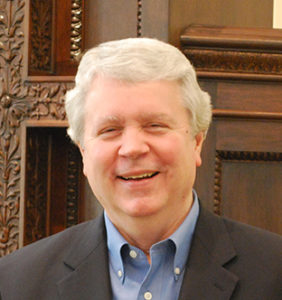Probably one of the last things clergy and lay leaders are worried about right now is history, especially with the ever-present coronavirus looking to overstay its welcome for who knows how long.
But John Finley, executive director of the Baptist History and Heritage Society, says churches ought to be documenting decisions and actions taken during COVID-19 because such information will be invaluable to ministers and congregations in the future.
“Local churches would benefit from preserving the primary source documents of this moment,” said Finley, former pastor of First Baptist Church in Savannah, Ga. “We need to preserve the memory of how moving online and into Zoom preserved our churches during this pandemic.”
Posterity isn’t the only beneficiary of methodical record keeping, he added. Records also can be used for church histories and to celebrate congregational anniversaries. And a surprising number of emails and letters arrive at the society from people doing their own family and church histories.
“The work of doing Baptist history is progressing,” he said. “There are people undertaking those tasks in a variety of places. And we do what we can to assist them. That continues.”
Finley, a longtime Cooperative Baptist Fellowship pastor, took the helm of the society in 2017. Today the organization has about 500 members plus “a much larger group who are friends.” He spoke with BNG about the society and the challenges it faces in the era of COVID-19.
Why is it important for Baptists to know their history?
It is important for Baptists to know who they are, who the significant persons and events and circumstances were that have helped make them who they are as a Baptist people today. It is by understanding our heritage that we can live in the present and look to the future and make wise choices. I think it really goes to the question of identity. To understand who you are, you have to understand where you come from.
Is it too soon to expect history papers about this pandemic?
Yes and no. It’s not too soon in that it’s always appropriate to be reflecting on your history even as it’s happening. But I would qualify that by saying we will only know the full impact of this pandemic as time goes by. That doesn’t need to discourage us in any way to preserve our history as it’s happening and to begin to assess it.
How have past pandemics been studied in this way?
One of the papers we were hoping to have presented at our annual conference this past May was titled, “Baptist Responses to the Spanish Flu Pandemic of 1918.” While it wasn’t completed by the time we canceled our conference in May, the paper was going to give some perspective on the terrible Spanish flu pandemic of 100 years ago, going through the primary source materials to gain some perspectives on what happened and how it affected Baptist life and Baptist churches and how Baptists responded.
What kinds of source materials should ministers preserve?
Pastors should preserve, in print and digital form, their worship services and their sermons. I think information like that will be increasingly valuable in the future. We should be documenting how worship changed when went we went to live streaming and Zoom.
In what other ways can churches or pastors use history for their ministries?
In recent years we have tried to take some steps toward local congregations about this. There are lay people and scholarly pastors and staff ministers who use materials we offer, either pamphlets or booklets or our peer-reviewed journal on Baptist history. Many of those articles provide background information or sermon illustrations, ideas on how to put together a series of sermons on Baptist history. We also work with congregations on ways to preserve the local churches’ history. We cover how to write a history book or how to celebrate a major anniversary at your church. We show churches how to preserve their records and how to uncover their history.
Are there ways the society is like a ministry or church itself?
There are some similarities. The society is not a church, but there is a kind of fellowship, a series of caring relationships, among its members. I would use the word “ministry.” We are identified as a partner minister of CBF and a few of the state CBF chapters. And it would be accurate to say the society provides a ministry to churches and denominational groups by providing resources to help them identify and preserve their heritage.
Has the society itself suffered significant impacts during the pandemic?
One of the biggest impacts was the forced cancellation of our annual conference in May, which was to be held at Samford University in Birmingham, Ala. It is the main event we sponsor every year, which we have done for years and years. It’s a major gathering usually held over three days. We also have experienced a somewhat diminished level of financial support. It’s understandable. It’s probably too early to tell what the impact will be this year, although I wouldn’t predict it will be overly dramatic. We know we are not alone in that. This pandemic affects every nonprofit group and ministry. And we do have very loyal, faithful, generous individual and institutional donors, who have continued to give during this time.

